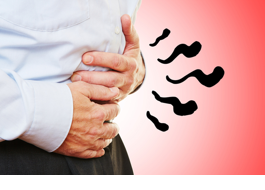Folic Acid – Is Your Body Using It Or Is It Benign?
First off, congratulations if you understood my pun. Folic acid or Folate is also known as vitamin B9. The name ...

First off, congratulations if you understood my pun. Folic acid or Folate is also known as vitamin B9. The name ...
Picture yourself cranking out a heavy set of squats, your training partner counting down as rep number 20 of an ...
Bloated stomach? Endless flatulence? Wicked diarrhoea? Believe it or not, you don’t have to live with these symptoms. Ever wonder ...
Everybody's familiar with testosterone, the grand daddy hormone most synonymous with both muscle and manhood. Today we provide a comprehensive ...
For all of us trying to reach the full potential of our health, it is important to be sure that ...
Building and maintaining muscle mass while concurrently stripping body fat to reveal the separation and conditioning which defines the elite-level ...
There is no need to go into detail about how important shoulder development (specifically deltoids) is to a complete physique. ...
One of the best strategies you can apply with success to a bodybuilders diet is protein rotation. In essence, eating ...
Bodybuilders, and indeed all athletes looking to secure the performance edge would have at least a passing knowledge of the ...
Whey protein has been used in one form or another for at least 300 years, yet it has taken until ...
In this eye-opening article, Ben gives a breakdown of what cardio ‘actually’ is, and how the application of this newfound ...
Question: “Let’s say we have your average trainee who works out four of five times a week, working each bodypart ...
In a previous article we discussed the key hormone leptin as it relates to hunger, weight gain and dietary adherence.
Leptin is classed as the ‘good’ hunger hormone that, when functioning normally, helps to control energy intake, hunger and overeating. In contrast, ‘ghrelin’ is often classed as the ‘bad’ hunger hormone, linked with increased hunger and poor dietary adherence.
Ghrelin is produced in the stomach and the levels produced are dependent on many factors including fed state (e.g. when you ate your last meal), other hormones such as leptin and growth hormone, and then things such as age, gender, fasting blood sugar and insulin levels.
Ghrelin’s daily mechanisms can be broken down into 2 simple stages:
1. We eat food, ghrelin decreases, this lowers hunger and our desire to eat.
2. Around 3 hours after eating, ghrelin levels start heading back to a baseline level, meaning hunger increases.
While the daily functions of ghrelin are normal and remind you to eat, the issue occurs when ghrelin levels change or become elevated, which means your perceived hunger increases. This often causes poor dietary adherence (think how many people quit diets or binge because they are excessively hungry), poor food choices, overeating, and rapid weight gain.
Understanding this hormone is therefore crucial for any physique competitor, bodybuilder, athlete, fitness enthusiast or coach. By keeping this hormone under control, dietary adherence and weight management will become much easier. These populations often engage in repeated dieting in an attempt to optimize their physique or performance, but research has shown that when you diet, ghrelin rapidly increases, which means hunger rapidly increases with it.
If you have dieted in the past, you will know firsthand how hunger constantly increases. The changes in ghrelin help explain this.
firsthand how hunger constantly increases. The changes in ghrelin help explain this.
Cummings et al. (2002) measured ghrelin levels following a 6 month weight loss intervention program and found a 24% increase in ghrelin levels. In addition, Rossow et al. (2012) investigated a male bodybuilder during a 6 month prep phase and witnessed around a 40% increase in ghrelin levels after 6 months of dieting.
The post-diet or post-contest weight rebound is well known, along with the psychological eating ‘issues’ many competitors face. This is likely caused from rapid elevations in ghrelin during the prep period, especially if these diets happen multiple times per year. It’s not unlikely in these cases that that ghrelin skyrockets on occasion, so don’t be surprised if you suddenly find yourself bingeing on 8000 calories in the buffet at some point!
Therefore, to make dieting easier, long-term weight management more successful, and people’s psychological relationship with food more healthy, one should aim to manage ghrelin and keep it within a normal range.
Here are some high level actionable dieting tips to help limit ghrelin and hunger adaptions caused by dieting:
Two example strategies for a fat loss calorie cycle may be:
It’s important to consider the integrative role that leptin and ghrelin play. One strategy used to counteract this is tracking calories / setting a daily food intake. Although this helps combat some of the free-eating issues, constant hunger and lack of satiety will likely make the weight-loss journey hard, possibly even unsuccessful in the long-term.
The issues apparent with leptin and ghrelin when dieting highlight the importance of a conservative growth phase, or “lean bulk”. A large amount of added fat mass may increase leptin resistance, and, furthermore, mean a longer time spent dieting to get rid of it, which will negatively impact ghrelin levels.